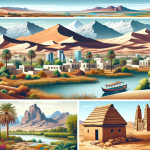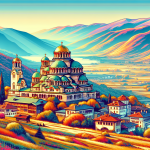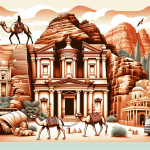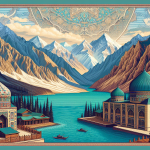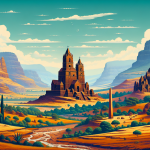Discovering the Enigmatic Charm of Azerbaijan
Nestled at the crossroads of Eastern Europe and Western Asia, Azerbaijan is a land that exudes an enigmatic charm, blending ancient traditions with modernity. Known as the “Land of Fire” due to its rich reserves of oil and gas, this country offers a unique travel experience that captivates the hearts of its visitors. From the bustling streets of Baku, the capital city, to the serene landscapes of the Caucasus Mountains, Azerbaijan is a treasure trove waiting to be explored. In this comprehensive guide, we will delve into the myriad attractions that make Azerbaijan a must-visit destination. Whether you’re an adventure seeker, a history enthusiast, or a cultural aficionado, Azerbaijan has something extraordinary to offer. Let’s embark on a journey to uncover the hidden gems, the cultural heritage, and the natural wonders of this fascinating country.
Exploring Baku: The Vibrant Capital
Old City (Icherisheher)
The Old City, or Icherisheher, is a UNESCO World Heritage site and the historical core of Baku. This labyrinthine fortress city is a living museum, with narrow alleys, ancient mosques, and historical buildings that tell the story of Azerbaijan’s past. Wander through the cobblestone streets and discover iconic landmarks like the Maiden Tower and the Palace of the Shirvanshahs.
Flame Towers
The Flame Towers are the modern symbols of Baku, representing the city’s nickname, the “Land of Fire.” These three skyscrapers dominate the skyline, and their LED screens illuminate the city with spectacular light shows at night. The Flame Towers are not just architectural marvels but also house luxury hotels, offices, and residential apartments.
Baku Boulevard
Stretching along the Caspian Sea, Baku Boulevard is a scenic promenade that offers a perfect blend of relaxation and recreation. Stroll along the boulevard to enjoy the sea breeze, visit the numerous parks and gardens, or take a ride on the Baku Ferris Wheel for panoramic views of the city.
Natural Wonders of Azerbaijan
Gobustan National Park
Gobustan National Park is a UNESCO World Heritage site known for its ancient rock carvings, mud volcanoes, and unique geological formations. The petroglyphs here date back to the Stone Age and provide a fascinating glimpse into the life of early humans. The mud volcanoes, a rare natural phenomenon, are another highlight of Gobustan.
The Caspian Sea
The Caspian Sea, the world’s largest inland body of water, is a natural wonder that offers a variety of recreational activities. From sunbathing on the sandy beaches to sailing and fishing, the Caspian Sea is a haven for water enthusiasts. The coastal resorts and spas provide a perfect retreat for relaxation and rejuvenation.
The Caucasus Mountains
The Caucasus Mountains, with their snow-capped peaks and lush valleys, are a paradise for nature lovers and adventure seekers. The region offers excellent opportunities for hiking, skiing, and mountaineering. The picturesque villages in the mountains are perfect for experiencing the traditional way of life and the warm hospitality of the Azerbaijani people.
Cultural Heritage and Traditions
Azerbaijani Cuisine
Azerbaijani cuisine is a delightful fusion of flavors influenced by various cultures and regions. Some must-try dishes include plov (rice pilaf), dolma (stuffed grape leaves), and kebabs. Don’t miss out on tasting baklava, a sweet pastry, and sherbet, a traditional Azerbaijani drink. The tea culture in Azerbaijan is also significant, and sharing a cup of tea is a symbol of hospitality.
Traditional Music and Dance
Music and dance are integral parts of Azerbaijani culture. Mugham, a traditional form of music, is recognized by UNESCO as a Masterpiece of Oral and Intangible Heritage of Humanity. The rhythmic dance forms, such as the Yalli and Lezginka, are performed during celebrations and festivals, showcasing the vibrant cultural heritage of Azerbaijan.
Festivals and Celebrations
Azerbaijan is a land of festivals and celebrations. Novruz Bayram, the Persian New Year celebrated in March, is one of the most important festivals, marking the arrival of spring. The festival involves various customs, including bonfires, traditional music, and dance performances. Other notable festivals include the Baku Jazz Festival and the Guba Apple Festival, each offering unique cultural experiences.
Hidden Gems of Azerbaijan
Sheki
Sheki, a charming town located in the foothills of the Greater Caucasus Mountains, is known for its rich history and architectural beauty. The Sheki Khan’s Palace with its intricate stained glass windows and decorative tiles is a must-visit. The town’s cobbled streets and historic buildings create a picturesque setting, making Sheki a perfect destination for history buffs.
Lahij
Lahij is a quaint mountain village famous for its copper craftsmanship and traditional handicrafts. The village’s narrow streets are lined with workshops where artisans create beautiful copperware, carpets, and textiles. Visiting Lahij offers a glimpse into the traditional lifestyle and craftsmanship that has been preserved for centuries.
Ganja
Ganja, the second-largest city in Azerbaijan, boasts a rich cultural and historical heritage. Key attractions include the Nizami Mausoleum, dedicated to the famous poet Nizami Ganjavi, and the Imamzadeh Mausoleum, a revered religious site. The Bottle House, built from thousands of glass bottles, is another unique landmark in Ganja.
Practical Travel Tips
Getting Around
Azerbaijan has a well-developed transportation network, making it easy to explore the country. Baku’s metro system is efficient and affordable, while buses and taxis are readily available for getting around the city. For traveling to other regions, consider taking a train or renting a car for more flexibility.
Best Time to Visit
The best time to visit Azerbaijan is during the spring (April to June) and autumn (September to November) when the weather is pleasant and the landscapes are vibrant. The summer months (July to August) can be hot, especially in Baku, while the winter season (December to March) offers excellent conditions for skiing in the mountains.
Safety and Health
Azerbaijan is generally a safe destination for travelers. However, it is always advisable to take standard precautions, such as avoiding unlit areas at night and keeping an eye on personal belongings. Ensure you have travel insurance that covers health and medical emergencies. Tap water in Azerbaijan is not always safe to drink, so it is recommended to drink bottled water.
Language and Communication
The official language of Azerbaijan is Azerbaijani, but English is widely spoken in tourist areas and major cities. Learning a few basic Azerbaijani phrases can enhance your travel experience and help you connect with the locals.
Currency and Payments
The currency in Azerbaijan is the Azerbaijani Manat (AZN). Credit cards are widely accepted in hotels, restaurants, and shops in Baku, but it is advisable to carry some cash, especially when traveling to rural areas. ATMs are readily available in cities for currency withdrawal.
Conclusion
Azerbaijan is a destination that offers a harmonious blend of history, culture, and natural beauty. From the modern allure of Baku to the serene landscapes of the Caucasus Mountains, every corner of this country has a story to tell. Whether you’re indulging in the rich flavors of Azerbaijani cuisine, exploring ancient historical sites, or enjoying the vibrant festivals, Azerbaijan promises an unforgettable travel experience. Plan your trip today and discover the enigmatic charm of this fascinating land.
For more detailed information about traveling in Azerbaijan, visit the Official Tourism Website of Azerbaijan.



